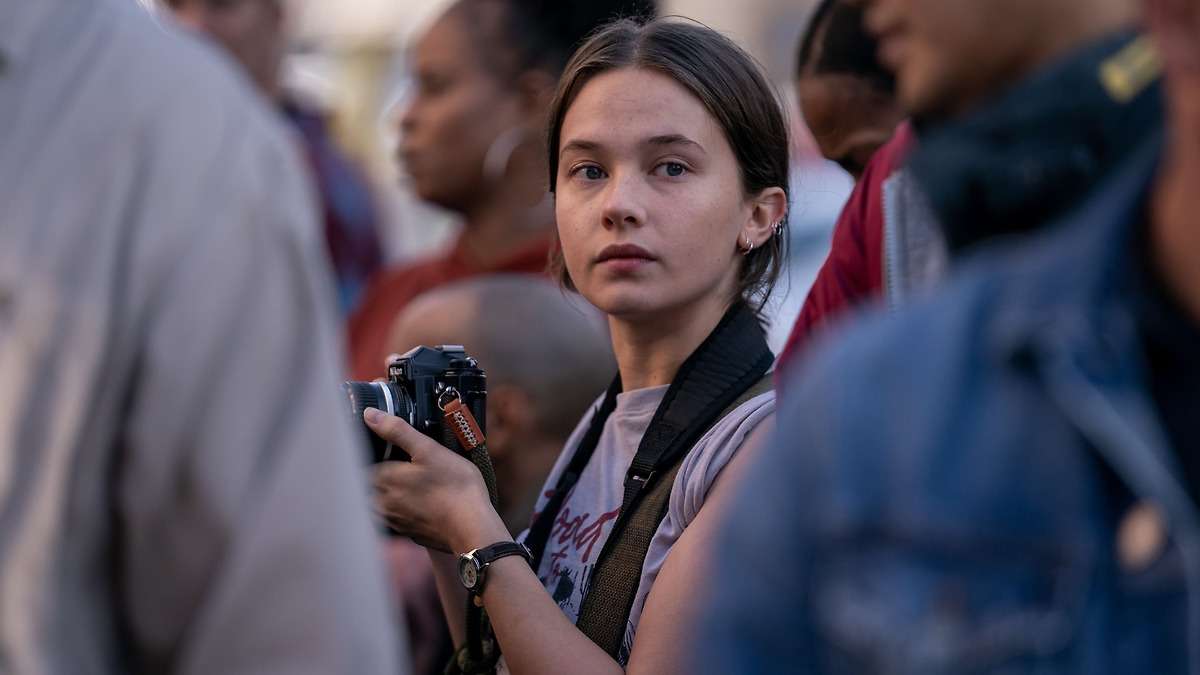
[ad_1]
A part of rising up is studying that a few of the movies you could have loved at an earlier age (struggle movies particularly) carry with them problematic parts—parts that bitter along with your developed political alignment. It thus turns into a step in that progress course of to determine how a lot of any movie’s political misgivings will issue into your newfound analysis of it. Alex Garland appears intent on avoiding this course of altogether together with his new movie “Civil Conflict” (2024) by insisting that it takes on a politically impartial stance, a place that has totally baffled some and angered others main as much as the movie’s launch.
However inside a couple of minutes of the runtime, Garland makes it clear that his intent with the “Civil Conflict” isn’t simply to be politically impartial; neutrality as an idea is your complete level of the movie. The movie is, on the finish of the day, a treatise on the very act of photojournalism—an ode to the souls who throw themselves into the guts of chaos each day to get the horrors of the entrance traces posted to our every day timelines, and a lamentation on the very act of being concerned in such occasions with out the capability, or need, to intervene. That’s all nicely and good, however after these jiffy, it will most likely profit such an bold endeavor to discover these implications of neutrality past its mere existence.
Civil struggle has damaged out within the continental United States, because the president (Nick Offerman, in what quantities to a blink-and-you’ll-miss-it look) declares that the seceding factions are inside weeks of being overtaken and reincorporated into the better territory. By means of all of it, veteran struggle photographer Lee (a stony Kirsten Dunst) and her journalist colleague Joel (Wagner Maura) are intent on getting an interview with the president earlier than it’s too late. Their journey to a ravaged D.C. by means of the carnage of the American states finds them accompanied by a fresh-faced upstart photographer and admirer of Lee’s, Jessie (Priscilla standout Cailee Spaeny, cementing her spot inside the A24 household), whose rugged enthusiasm in the direction of her chosen occupation could also be challenged by the very sorts of horrors that make it a mandatory job in any respect.
The interior indifference required for somebody to tackle a harrowing occupation with such starkly neutral composure is the gasoline that drives “Civil Conflict”—“As soon as these questions begin coming,” Lee tells her sudden new protégé, “…they by no means cease. So it’s greatest to only not ask them in any respect.” How far can one go earlier than the atrocities in entrance of them irreparably snap one thing deep inside their soul? How far can the prospect of “sending a warning again residence” inspire you to maintain standing inches away from dying and coldly documenting it?

The timing of Civil Conflict’s launch is being touted as significantly urgent on account of its prevalence throughout an American election yr, however the continued atrocities raging abroad, filtered by means of the relative indifference of our social media feed, makes for a much more pressing second to be unveiling such a stance on frigid indifference. Garland, with the essential concept in entrance of him, merely has nothing so as to add to the dialog that months and months of horrid desensitization haven’t instructed us already. Even inside the realm of cinema solely, “Civil Conflict” presents a relatively lukewarm examination of the abject terror that comes from extended publicity to such dehumanization, particularly with none type of political stance to floor it.
Positive, you’ll be able to argue that the aforementioned take of the movie as an examination of frontline journalism as being an inherently brutalizing however tragically mandatory piece of the struggle cycle is sufficient, however the very act of following these individuals within the first place implies a need to get to know them sympathetically—a notion Garland enforces by means of sporadic, half-hearted moments of interplay within the downtime. On that entrance, whereas the actors do their greatest to infuse these moments with some actual gravity, the characterization is introduced so limply that each one you’re left to connect your self to is the bottom empathy you are feeling for individuals caught in these circumstances.
A better concern, then, turns into Rob Hardy’s luxurious cinematography. The uncommon case of a movie trying too good for what it’s aiming to be, Garland and Hardy current these horrors with a picturesque magnificence that considerably matches into the concept of aestheticizing the horrors of carnage. That mentioned, the wealthy, shallow focus and cautious slow-motion taking pictures do little to carry you into the sense of actual hazard, leaving you distant from the hazards of the story however too conventionally shut to those characters’ sides to understand the movie’s tried themes of objectivity. By the point “Civil Conflict” reaches its closing set-piece, you’re just too numb to any of it to care when Alex Garland lets the siren blare.
Learn Extra: Filmmaker Alex Garland Confirms Retirement from Directing Simply Earlier than The Launch of ‘Civil Conflict’
Civil Conflict (2024) Film Hyperlinks: IMDb, Rotten Tomatoes, Wikipedia, Letterboxd
The Solid of Civil Conflict (2024) Film: Kirsten Dunst, Cailee Spaeny, Wagner Moura, Stephen McKinley Henderson, Nick Offerman
Civil Conflict (2024) Film Style: Motion/Drama, Runtime: 1h 49m
The place to look at Civil Conflict
[ad_2]
